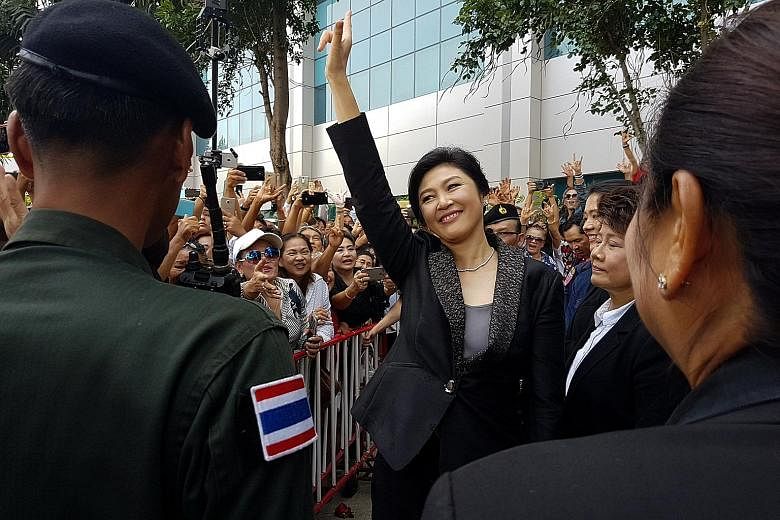Calling herself the "victim of a subtle political game", ousted Thai premier Yingluck Shinawatra yesterday urged a court to dismiss a criminal negligence charge against her over her government's agricultural subsidy scheme.
"I have done nothing wrong," she told the court, her voice breaking near the end of her hour-long closing statement. "There is proof that during the implementation of the (rice pledging scheme), the rice farmers had better quality of life and their children had opportunities to further their studies."
Yingluck's government ran up a multibillion-dollar bill under the rice pledging programme, which allowed farmers to sell paddy to the state at some 50 per cent above market prices. Farmers, in response, ramped up production, filling state warehouses with about 18 million tonnes of rice by the time her government was ousted in a military coup in 2014.
The scheme left Thailand with huge stockpiles of rice.
Critics charge that the scheme was tainted by graft. But Yingluck argues that punishing her for this scheme could deter future leaders from trying other public policies.
The verdict will be delivered on Aug 25. She could be jailed for up to 10 years if convicted.
Yingluck's bank accounts and other accounts have been frozen pending the conclusion of a separate bid by the military government to fine her some 35 billion baht (S$1.42 billion) for losses incurred under the rice scheme. She declared 610 million baht in assets in 2015.
She told the nine Supreme Court judges yesterday: "I trust that never before has anyone implementing public policy for the benefit of the country been unfairly treated and his own assets been seized before the criminal case is decided. This is against international justice principles."
The Cabinet had collective responsibilities, Yingluck said in a courtroom packed with former parliamentarians from her Puea Thai party as well as diplomats. "I could not exercise my power arbitrarily to interfere, make orders, or influence operations for anyone's interest," she added.
Outside the courtroom, hundreds of supporters kept vigil, watched closely by columns of policemen. Many of her followers, such as 72-year-old Cholakan Onprathum, had travelled overnight from distant provinces like Nong Khai. "I came here to encourage our former prime minister," she told The Straits Times. "I feel great sympathy for her."
Yingluck's Puea Thai party won a landslide victory in 2011 on the back of support from rural voters in north-east and northern Thailand. Although her government also gave tax rebates for first-time buyers of cars and homes, it was the rice-pledging scheme that drew the most opposition from Bangkok's middle-class voters.
They accused her government of financial irresponsibility and corruption, and played a key role in street protests from 2013 onwards aimed at pressuring her to resign.

